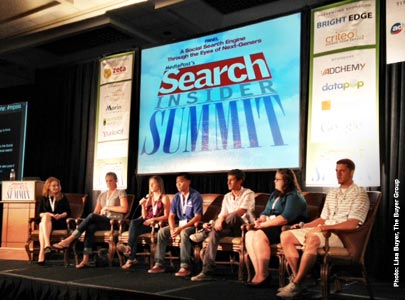Microsoft Taps Students For Social, Search Input
- by Laurie Sullivan @lauriesullivan, April 25, 2012

What if developers built an advertising engine and laid a layer of social and search on top? Paid-search ads arrived long after the development of search platforms, but Lili Cheng, GM at Microsoft Research, is challenging marketers and students to think differently.
Cheng delivered the Day 3 keynote at the MediaPost Search Insider Summit Wednesday. She said Microsoft Research created a social media student advisory working group with several universities, including NYU, Syracuse, Carnegie-Mellon, and the University of Washington.
The group works with other students to create apps. One in particular created a feature that lets people stay informed about the violence in Mexico. The app lets users search the Web through social to find information not really available through traditional search engines, such as tracking crime in real-time to create a safer environment.
Cheng also demonstrated So.cl, a social-search engine introduced into beta in December, and encouraged the summit attendees to think differently about social and search.
If today's youth built a social and search tool, what would it look like? Students from Florida Gulf Coast University shared their views at the conference, expressing the need to integrate social and search without flipping between applications.
Social content aggregators took precedence in the discussion. Sarah Brolsma Whitfield, a senior in communications at Florida Gulf Coast University, wants to see tools become more interactive. Daniel Pfaffenbach, a senior in communications at FGC, uses Flipbook, which allows him to flip seamlessly between apps.
Pfaffenbach said the perfect search-social engine would have a wall between search and social accounts, but would allow users to integrate apps.
Part of the session addressed the issue of ads on social sites. Only two out of six students have clicked on Facebook ads --one by mistake, while the other wanted more information on the topic shown in the ad. All agree that the ads don't seem relevant to their profile, which Pfaffenbach referred to as a life book of real-world events.
When asked why the students don't click on Facebook ads, one thought the ads were infected with viruses.
Noted in a Twitter tweet, Lisa Buyer, CEO at The Buyers Group, thought it interesting that the college students seem to "misunderstand targeting of ads on Facebook."


